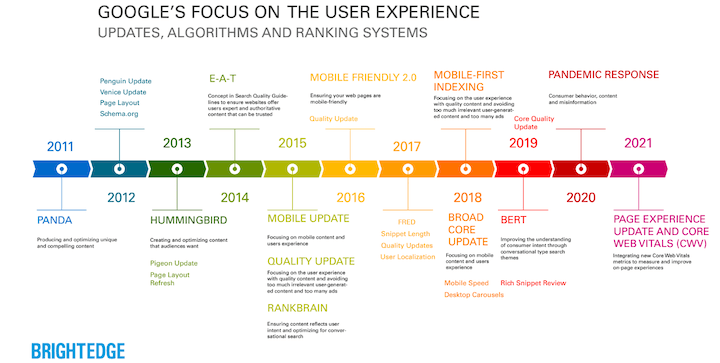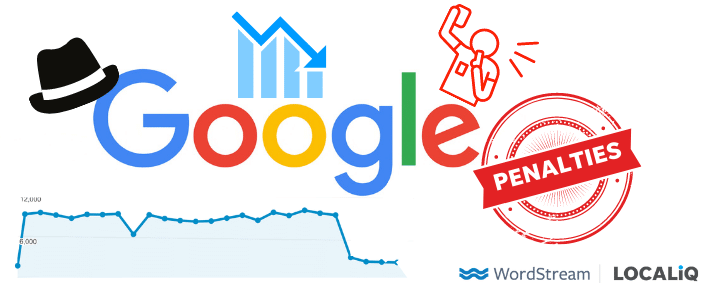Don’t let your website get penalized! Learn all about Google penalties and how to avoid them in this informative post.

Image courtesy of via DALL-E 3
Table of Contents
- Introduction: Understanding Google Penalties
- Why Are Google Penalties Given?
- Different Types of Google Penalties
- How to Check if Your Website Has a Google Penalty
- Steps to Fix and Avoid Google Penalties
- The Benefits of Staying Penalty-Free
- Conclusion: Keep Your Website Safe from Penalties
- Frequently Asked Questions (FAQs)
Introduction: Understanding Google Penalties
Have you ever wondered why some websites appear at the top of your search results while others are buried deep down? One big reason for this is Google Penalties. In the world of the internet, Google is like the referee, making sure websites play by the rules. When a website breaks these rules, Google can penalize it. Let’s dive into what Google Penalties are and why they matter in the world of SEO.
Why Are Google Penalties Given?
Google Penalties may sound concerning, but they are actually given for a good reason. Think of Google as a big library where you search for information. Google wants to make sure that when you search for something, you find the best and most reliable information available. That’s why Google has rules that websites need to follow in order to show up in search results.
Breaking the Rules
When websites don’t follow Google’s rules, they might receive a penalty. Breaking these rules is like not playing by the agreed-upon guidelines in a game. Google wants to make sure websites play fair and provide helpful content to people searching for information.
Types of Bad Behavior
There are different ways websites can misbehave and break the rules. Some websites try to trick Google by using too many keywords that have nothing to do with their content. Others might have spammy links that lead to low-quality websites. These actions make it harder for Google to show the most useful and accurate information to its users.
Different Types of Google Penalties
When it comes to Google penalties, there are two main types that website owners need to be aware of: manual penalties and algorithmic penalties. Let’s break down each type to understand how they can affect a website’s search engine visibility.

Image courtesy of via Google Images
Manual Penalties
Manual penalties are imposed by actual humans at Google. These penalties are usually given when a website is found to be violating Google’s guidelines intentionally. It could be due to issues like unnatural links, keyword stuffing, or thin content. When a manual penalty is imposed, a notification is sent to the website owner through Google Search Console, detailing the reason for the penalty and what needs to be fixed.
Algorithmic Penalties
On the other hand, algorithmic penalties are automatically applied by Google’s algorithms. These penalties occur when a website triggers certain filters or updates in Google’s algorithm. Common reasons for algorithmic penalties include duplicate content, spammy links, or poor user experience. Since algorithmic penalties are automatic, website owners may not receive a direct notification when they are hit with these penalties. Instead, they need to monitor their website’s performance and rankings to identify any sudden drops.
How Google Penalties Affect Your Website
When your website receives a Google Penalty, it can have a significant impact on how well it performs in online searches. Let’s take a closer look at how these penalties can affect your website’s ranking and the number of visitors it receives.
Lower Ranking
Imagine you are searching for something on Google, like a new video game or a yummy recipe. You probably click on one of the first few websites that show up in the search results, right? Well, if your website gets a Google Penalty, it might not appear at the top of the search results anymore. That means fewer people will see your website when they search for things related to it.
Less Traffic
With your website appearing lower in the search results, fewer people will click on it. This decrease in clicks means less traffic coming to your website. Just like how a popular snack gets more attention in a vending machine, websites that show up higher in search results get more visitors. So, getting a Google Penalty can lead to fewer people visiting your website.
How to Check if Your Website Has a Google Penalty
It’s important to know if your website has been hit with a Google Penalty so you can take the necessary steps to fix it. Here are some ways to check if your website has been penalized by Google.
Using Google Search Console
One of the best ways to check if your website has a Google Penalty is by using Google Search Console. This free tool provided by Google gives you insights into how your website is performing in search results.
Once you log in to Google Search Console, you can navigate to the “Security & Manual Actions” section to see if any manual actions have been taken against your site. If there are any penalties, Google will provide details on what caused them.
Other Tools
In addition to Google Search Console, there are other tools available that can help you detect if your website has been penalized. Tools like Moz Pro, SEMrush, and Ahrefs offer features that can analyze your site’s backlinks, keywords usage, and overall health to see if there are any penalties affecting your site.
Steps to Fix and Avoid Google Penalties
So, you’ve discovered that your website has received a Google Penalty. Don’t panic! Here are some steps you can take to fix the issue and prevent future penalties.

Image courtesy of via Google Images
Fixing a Penalty
If you’ve identified the problem that caused the penalty, it’s time to take action. Here are some steps to help you resolve the issue:
1. Identify the Issue: First, pinpoint the specific reason for the penalty. It could be due to using spammy links, keyword stuffing, or other violations of Google’s guidelines.
2. Remove or Disavow Bad Links: If spammy links are the culprit, work on removing them from your website. If that’s not possible, use Google’s Disavow Tool to disavow those links.
3. Fix On-Page SEO: Ensure that your website is following SEO best practices. Make sure your content is relevant, informative, and not overstuffed with keywords.
4. Request Reconsideration: If you’ve made the necessary changes, submit a reconsideration request to Google. Explain the steps you’ve taken to rectify the issue and request a review of your website.
Avoiding Future Penalties
Prevention is key to maintaining a healthy website. Here are some tips to help you avoid Google Penalties in the future:
1. Follow Google’s Guidelines: It’s essential to abide by Google’s rules and guidelines. Stay updated on any changes in their algorithms and adapt your website to comply with them.
2. Quality Content: Focus on creating high-quality, original content that provides value to your audience. Avoid duplicate content or content that doesn’t add any real value.
3. Natural Link Building: Instead of buying links or engaging in link schemes, focus on natural link building. Earn links from reputable websites through quality content and engagement.
4. Regular Audits: Conduct regular SEO audits of your website to identify any potential issues. This will help you catch and rectify problems before they lead to penalties.
By following these steps and maintaining good SEO practices, you can not only fix any existing Google Penalties but also prevent future penalties from affecting your website’s performance.
The Benefits of Staying Penalty-Free
Following Google’s guidelines and avoiding penalties can have many benefits for your website and its overall health. Let’s explore why staying penalty-free is crucial for a successful online presence.
Better Rankings
By adhering to Google’s rules and regulations, your website is more likely to rank higher in search results. When your website ranks higher, it becomes more visible to potential visitors who are searching for relevant information or products. This increased visibility can lead to more organic traffic to your site.
More Visitors
With better rankings comes an influx of visitors to your website. When users see your website listed at the top of search results, they are more likely to click on your link and explore your site. This increase in traffic not only boosts your website’s performance but also opens up opportunities for higher conversion rates and engagement with your audience.
Conclusion: Keep Your Website Safe from Penalties
It is crucial to keep your website safe from Google Penalties to ensure that it ranks well in search engine results. By following SEO best practices and staying up to date with Google’s guidelines, you can avoid the pitfalls that come with penalties. Remember, a penalty can lower your website’s ranking and reduce the traffic it receives, which can have a significant impact on your online presence.

Image courtesy of via Google Images
By fixing any penalties that are detected and implementing strategies to avoid future penalties, you can maintain a healthy website that attracts more visitors and performs better in search results. Keep your website safe by focusing on good SEO practices, creating high-quality content, and following Google’s rules. This way, you can enjoy better rankings and increased visibility without the threat of penalties affecting your online success.
Want to turn these SEO insights into real results? Seorocket is an all-in-one AI SEO solution that uses the power of AI to analyze your competition and craft high-ranking content.
Seorocket offers a suite of powerful tools, including a Keyword Researcher to find the most profitable keywords, an AI Writer to generate unique and Google-friendly content, and an Automatic Publisher to schedule and publish your content directly to your website. Plus, you’ll get real-time performance tracking so you can see exactly what’s working and make adjustments as needed.
Stop just reading about SEO – take action with Seorocket and skyrocket your search rankings today. Sign up for a free trial and see the difference Seorocket can make for your website!
Frequently Asked Questions (FAQs)
What is a Google Penalty?
A Google Penalty is like a punishment given to websites that don’t follow the rules set by Google. When a website breaks these rules, Google can make it harder for people to find that site when they search on Google.
How can I avoid getting a Google Penalty?
To steer clear of Google Penalties, it’s important to play by Google’s rules. Here are some quick tips to help you stay penalty-free:
– Don’t try to trick Google by using hidden text or too many keywords.
– Make sure your website has good, helpful content that people will enjoy.
– Stay away from buying links from other websites just to boost your own ranking.
What happens if my website gets a penalty?
If your website gets a Google Penalty, it can have some serious consequences. Your site may show up lower in search results, which means fewer people will visit your website. This can lead to a drop in the number of visitors and hurt your website’s performance.







